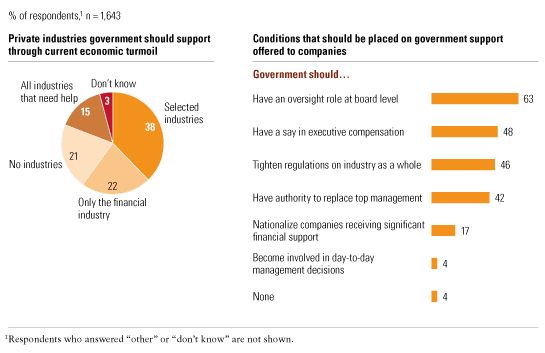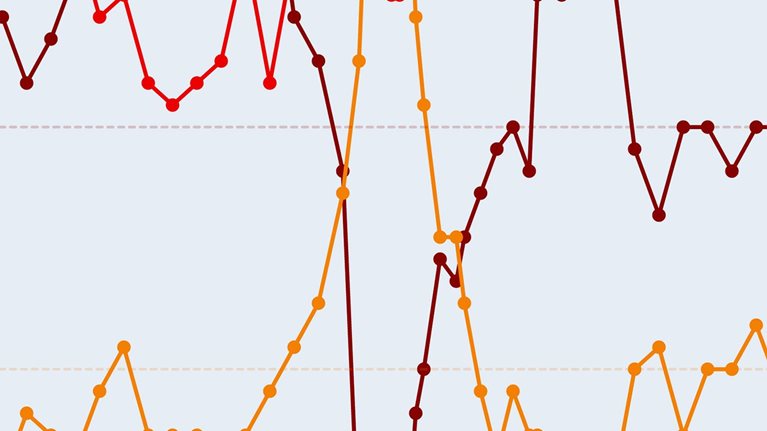Nearly a quarter of executives expect their nations’ economies to be in better shape by the end of June—significantly more than thought that six weeks ago—according to a survey in the field from April 13 to 17,1 during the stock markets’ recent rally. And 35 percent now expect an overall economic upturn by the end of 2009; slightly more expect an upturn in demand for their company’s products or services by then.
As governments have struggled with the best approach to weathering the economic crisis, many supporting industries one way or another in recent months, executives’ support for government action to bolster industries has waned a bit. Among those who do support action, most think the government should have oversight, at least at the board level, of the companies it assists.
More broadly, in the face of some industry and public calls for protectionist legislation, respondents to this survey—in every region and industry—see such legislation as harmful to national economies, and only 4 percent see it as helpful to their companies. Underscoring findings from another recent survey that trade flows will only be slowed temporarily as a result of the crisis,2 more than two-thirds of executives expect China, with its export-led economy, to have greater influence on the world economy as a result of the crisis; 57 percent expect US influence to weaken.
International interests, government actions
Respondents see value in international trade, even in the face of a crisis. Strong majorities of executives in all regions believe regulations to restrict imports and exports would damage their countries’ economies; the global average is 73 percent. Far fewer (only 37 percent), however, see harm to their companies’ financial positions from such regulations, while only 4 percent say they think trade restrictions would improve their companies’ financial positions. Executives at manufacturers and high-tech and telecom companies are the likeliest to see harm to their companies from protectionist regulation, at 51 percent and 44 percent, respectively.
Further, executives see value in maintaining international ties in response to the crisis: 70 percent say that, whatever the response, governments should coordinate it with their trading partners or other relevant countries.
Executives’ enthusiasm for governments bolstering industries through the crisis is cooling. Though most respondents still think governments should support at least some industries through the crisis, a fifth now say no industries should receive government support (Exhibit 1)—a notable increase from the 14 percent who said the same in January in response to a similar question.3
Little agreement on how to restore liquidity

Similarly, only 14 percent say the best single approach to restoring liquidity would be providing a fiscal stimulus across industries. With regard to the alternatives, however, there is little agreement on what approach would be better.
When governments do support industries, executives say, the governments should have a voice in many kinds of corporate decisions. Sixty-three percent say governments should have oversight at the board level when they offer a company support. More than 40 percent support governments having a say in compensation or replacement of top management (Exhibit 2).
Government’s role in corporate decisions

Growth expected soonest in China and India
Executives expect the crisis to change the relative economic influence of some nations. A sizable majority—71 percent, far more than for any other country evaluated—expects China will emerge from the crisis economically stronger; more than half predict the United States will emerge weaker (Exhibit 3).
Even now, just over half of respondents in China (and half in India) say they expect their nations’ economies to be in better shape by the middle of this year. Worldwide, there is less optimism, with 22 percent of all executives expecting a moderate or substantial improvement (Exhibit 4). The proportion of all executives saying their economies are worse than they were in September 2008 is slightly smaller than it was six weeks ago.
A changing balance of power

Improving expectations

Further, nearly 60 percent of respondents in China and two-thirds of those in India expect their countries’ GDPs to grow in 2009. A majority of respondents in all the developed economies still expect their GDPs to decline in 2009, as has been in the case since autumn 2008.
Globally, the proportion of executives expecting an economic upturn by the middle of 2010 has increased by five percentage points, to 35 percent, since early March.
Some companies see light at the end of the year
Overall, executives’ medium-term expectations for their companies’ profits and workforces remain depressed: 55 percent expect profits to decrease in the first half of 2009, and 52 percent expect to decrease the size of their workforces in the same span (in March 2009 the numbers were 53 percent and 50 percent, respectively). Though business isn’t good, the survey results also indicate that company finances are, for the most part, sufficient without new external funding. Most companies aren’t seeking external funding; only 29 percent have done so since September 2008 (Exhibit 5).4 Among those that have sought funds, nearly half report being able to get all of the funds they’ve sought, and another third at least some of those funds. Almost as many—nearly a third—report getting funds from new credit lines as from existing ones.5
Stability in company finances

Looking further ahead, many executives—39 percent—expect demand for their companies’ products or services to increase by the end of 2009, compared with 28 percent who expect a decrease. And most companies are actively pursuing growth opportunities: two-thirds of respondents say their companies are seeking growth through new customers in existing markets, and 61 percent through new products and services (Exhibit 6). The proportion introducing new products or services specifically to gain market share from weakened competitors has grown a bit since January 2009—to 40 percent, from 36 percent.
Finally, while about a third of all respondents say their companies are taking tighter control of functions or business units in response to the crisis, a majority are staying the course: 20 percent say reporting lines won’t change, and 36 percent say no governance changes are in store. That more than half are taking no action is consistent with a finding from the March 2009 survey, when more than half of respondents thought their companies’ management had handled the crisis well.
Seeking organic growth



